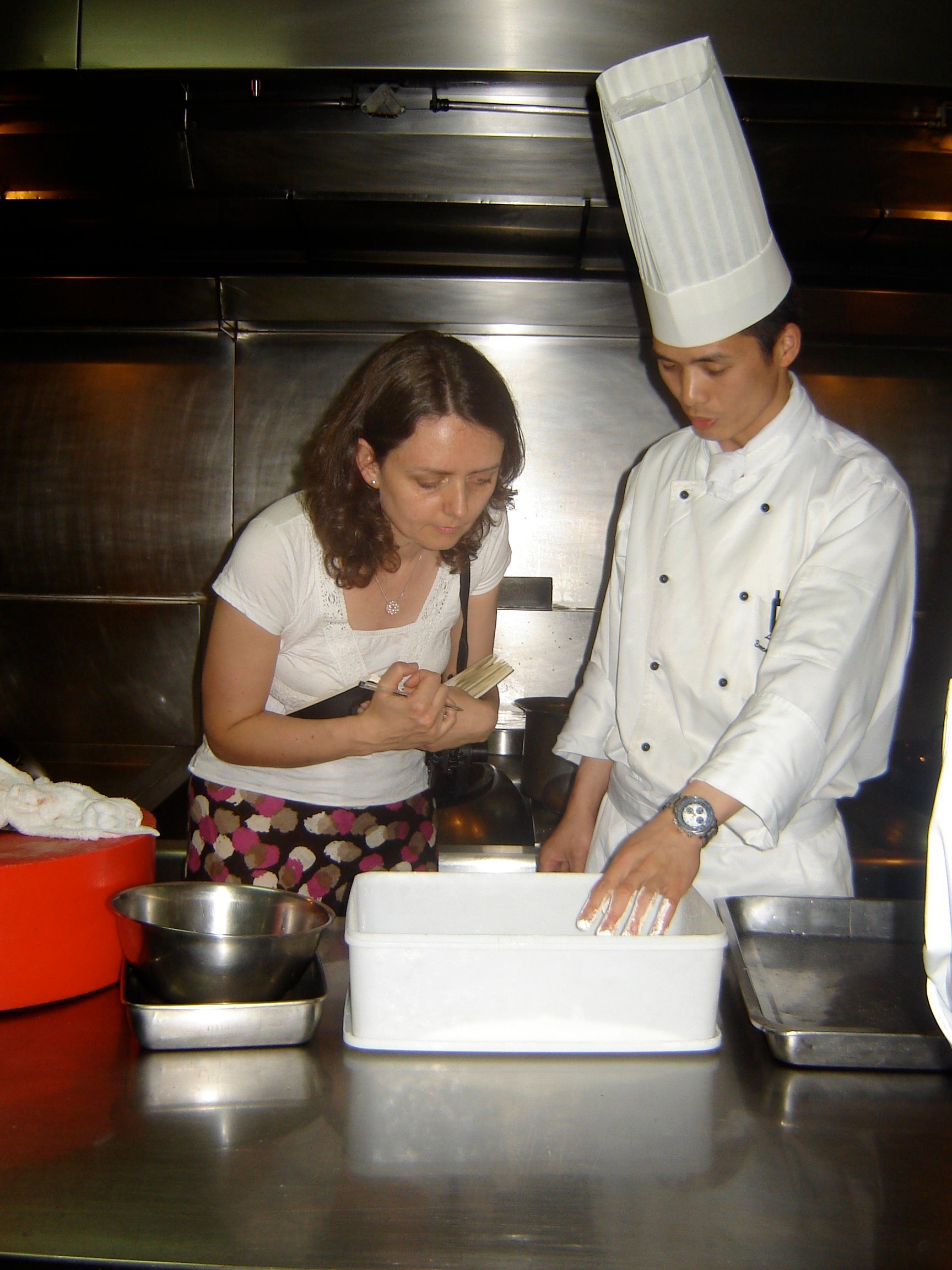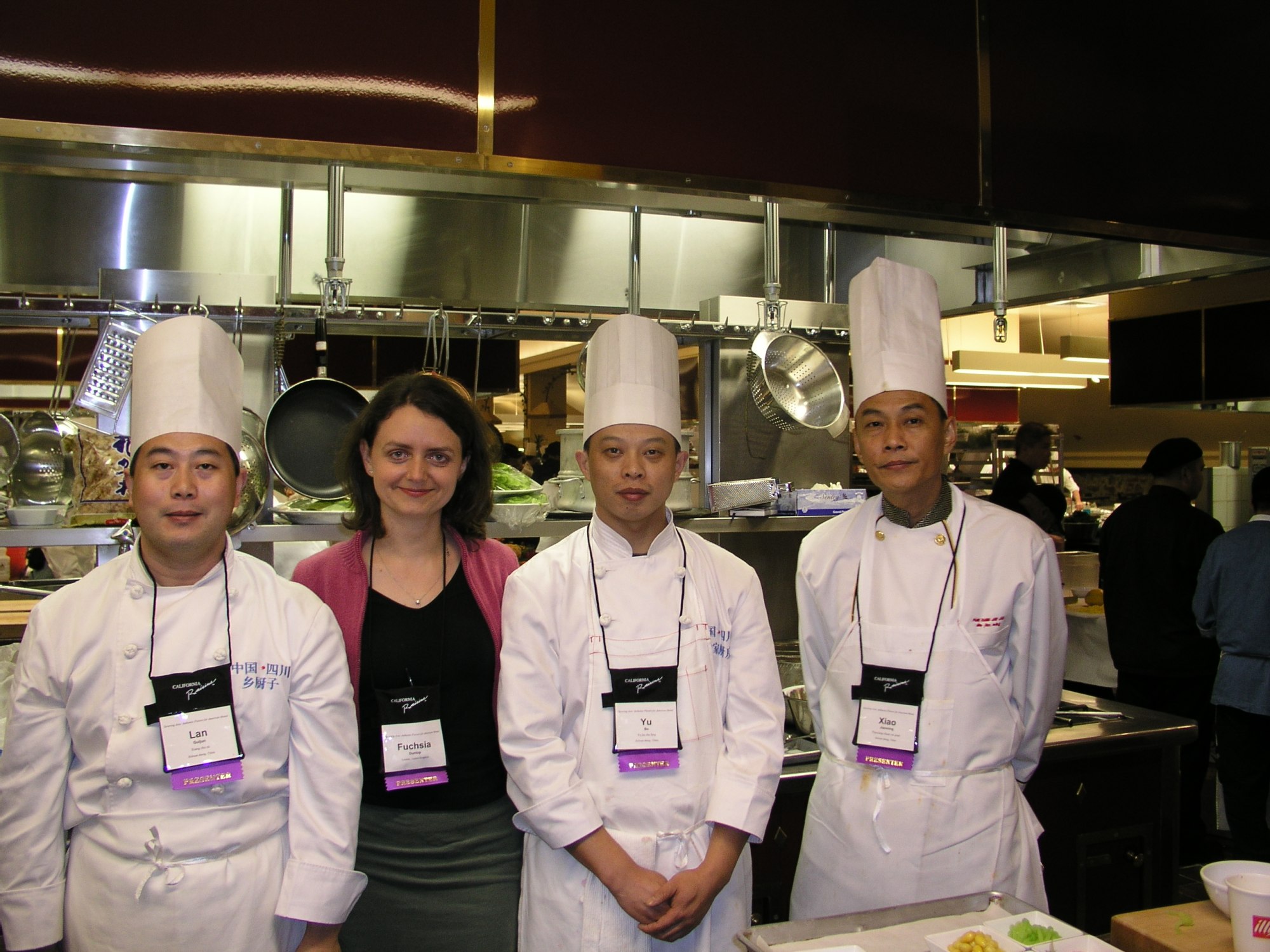
Profile | British chef and Chinese cookbook author Fuchsia Dunlop on why she’ll ‘never get bored’ of spreading China’s regional cuisines to the world
- Fuchsia Dunlop’s first cookbook on Sichuan food broke the mould in the UK, and she has since demystified Hunan cuisine and more to the English speaking world
- The author talks about her culinary journey through China and why she’ll continue writing, ahead of her appearance at Hong Kong International Literary Festival
My mother claims she can remember the look of radiant joy on my face when I first tasted solid food as a tiny baby. She taught English as a foreign language and growing up in Oxford we always had a foreign student or two living with us as au pairs and helping out with me and my younger sister.
They would always cook a bit and leave a few recipes in the family repertoire. My mother would invite her students over for dinner. They came from Japan, Greece, Sudan, Lebanon and Saudi Arabia. So, I had an unusually international life for 1970s Oxford when it came to food.
From when I was very small, I always loved helping my mother in the kitchen and she was always teaching me. I loved shelling peas and picking over rice to get the stones out as a child. As a teenager, I did a lot of French patisserie and loved making pastry and choux.
Oxford was a very academic place and most of my friends’ parents were pushing them to practise their instruments or do their homework, but my parents were relaxed. I wasn’t terribly good at doing my homework, but I did do a lot of cooking and drawing and painting.

An Italian student who stayed with us gave me Leith’s Cookery Course by Prudence Leith and Carolyn Waldegrave in my early teens. It was a hefty book for my age but became my foundation book.
I learned how to pluck and roast pheasant from that book and make creme patisserie. As a teenager, my dream was to go to cooking school in Paris, but I didn’t have the money and it didn’t happen.
Why ordering a Chinese meal is ‘like a symphony’ for author Fuchsia Dunlop
I was quite good at school but not incredibly diligent. I was always interested in many things and found it hard to sit down and do homework. I did knuckle down when it came to A-levels. I had a good memory and was good at exams.
After my A-levels, I spent a year at the Banbury Art School doing an art foundation course. It was excellent training in drawing and painting. In 1988, I went to Cambridge University.
It is quite an amazing privilege to grow up in Oxford and go to Cambridge because they are both beautiful, historic cities. I studied English Literature.

People used to joke that it was a useless degree and that students just sat around looking out of the window all day while the scientists were busy in their labs, but it actually turned out to be the most fantastic grounding.
There was a rigour to it that I didn’t appreciate at the time – reading lots of good books and thinking critically about them. In my second year at university I shared a flat with a friend and we cooked like crazy and ate the most wonderful food.
I used to make Chicken Normandy a lot – it was a tremendously rich chicken dish cooked Normandy style with onions and cream and apples. I also made crème brûlée a lot. My flat mate claimed she doubled in size while living with me.
I want to write about Chinese food. It’s such a rich subject and it’s been relatively unexplored in English
After I graduated, I got a job in London sub-editing a publication about the Asia-Pacific region, Summary of World Broadcasts. I became interested in China and in 1992 went backpacking around China by myself for four weeks.
It was my first taste of anything outside of Europe and I found everything very new and fascinating. I didn’t speak Chinese and was tied to my Lonely Planet guidebook. I went to Guangzhou, Guilin and then Chongqing and on a boat through the Three Gorges and to Beijing.

I met up with a Chinese musician who I’d met in Oxford and he and his wife took me around for a few days.
We went to a famous snack restaurant, Long Chao Shou. It was all very tasty, but as a cook I was curious because the textures were unfamiliar, and I had no idea what anything was made from. On the last day we went to a teahouse by the river and I decided I wanted to come back to Chengdu and live there.
The British Council had an exchange programme with China. It was an excellent scholarship programme and such a major contribution to the understanding of China. All the China specialists in academia, journalism, the civil service and the arts did British Council scholarships. I applied to do History of Chinese Ethnic Minorities at Sichuan University and arrived in 1994.
‘Respect the culture’: how UK author Fuchsia Dunlop champions Sichuan food
There were 100 foreign students from all over the world living in a building at Sichuan University. It was a big culture shock and I was a bit miserable in the beginning. Then I decided to just relax and enjoy it.
There were lots of nice restaurants around the university and I began to ask some of them if I could study in their kitchens. They often said yes – I think it was the novelty factor or a foreign university student wanting to be in a kitchen cooking.

I started informally being in kitchens, watching and taking notes and learning about food. A German classmate heard about the Sichuan Higher Institute of Cuisine. We cycled there one afternoon to ask if we could take some classes and they agreed. For a month or two, they offered private classes for the two of us.
In 1995, I spent three months training with 50 young Sichuanese men and two other women at the Sichuan Higher Institute of Cuisine. I didn’t see it as a career move, I did it because I loved cooking and was really interested.
Cookbook: Fuchsia Dunlop’s Land of Fish and Rice
When I came back to the UK after this incredible year in Chengdu, I thought it would be an idea to write a cookbook and did a proposal, but it was rejected by six publishers who said it was too niche.
I did a masters in Chinese Studies at the University of London’s School of Oriental and African Studies because I wanted to learn more about the country and its history. The course was great and involved some reading about food because one of the lecturers was interested in food.

I revised my book proposal, it was much better and more considered, and both the publishers I sent it to wanted it. Michael Joseph, which was a division of Penguin, had taken on a chef as a consultant who was looking for the next interesting thing in food writing. They agreed to publish a Sichuan cookbook.
I spent several more years going back and forth and researching it. Sichuan Cookery came out in Britain in 2001. It was the first time there had been this kind of research on the ground for a Chinese regional cookbook and it got a lot of attention from the food people.
After it was published in America, I started writing for American food magazines and my unlikely career started.

It wasn’t as laid back and gentle as Sichuan, the language was a staccato dialect and it was brisker. It was the period of the Sars epidemic and the few foreigners that were there left. I was miserable at first and nearly gave up, but I made some very good local friends, which is why I stayed.
The second cookbook was The Revolutionary Chinese Cookbook, because Hunan was the home of Chairman Mao and supposed to be this centre of revolutionary spirit.

The next book was a memoir – Shark’s Fin and Sichuan Pepper – which was all about the experience of being a foreigner at the cooking school in Sichuan and more generally about what it’s like to be a foreigner to open yourself up to a completely different cuisine and culture. And then more cookbooks followed; I’ve written seven books and a collection of essays which is only in Chinese.
Beginning in 2006, I worked with the first serious Sichuan restaurant in London, Barshu, as their consultant, helping them devise the menu and then explain it because Sichuan was a completely new cuisine. More recently, I’ve helped with Grand Majestic Sichuan Restaurant in Hong Kong, working with them on the menu and events.
Everyone dreams of opening a restaurant, but it’s a very specific set of skills. I think if I did start a business, it would be all consuming for the first couple of years, and I’ve got a queue of books I want to write about Chinese food. It’s such a rich subject and it’s been relatively unexplored in English. There still aren’t that many regional Chinese cookbooks.
‘Best of’ Chinese cuisine, from Sichuan to Hunan to Taiwan
Personally, I find it a completely fascinating subject and I’ve met so many incredible people. I know I will never get bored with the subject – and I love cooking and eating Chinese food, too, which is a big part of it.
I think it’s an important way of understanding China, particularly given international tensions. I have been so generously supported and encouraged by friends in China who have seen some value in what I’m trying to do. I couldn’t do anything without them.

